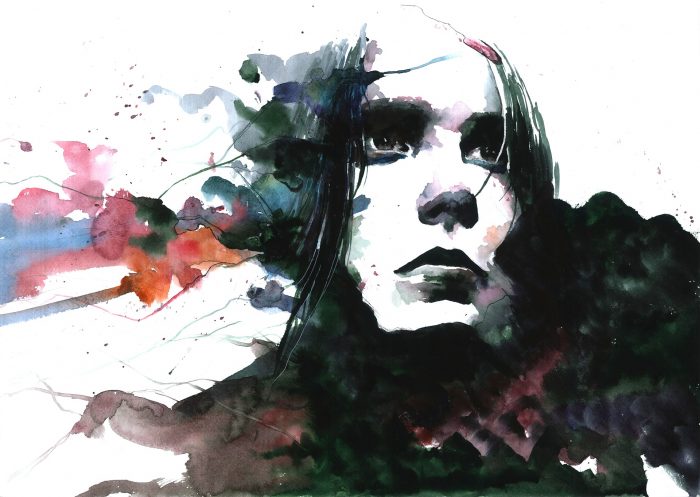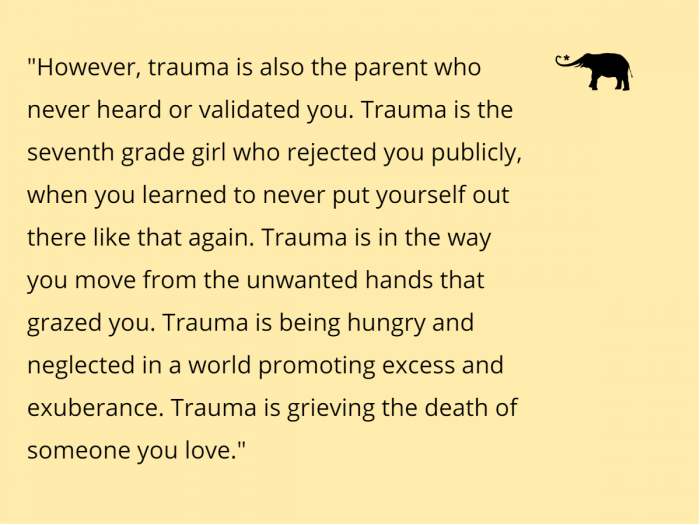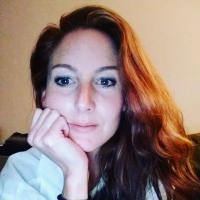The first time I tried to do yoga after my car accident, I had a few revelations.
My bruises are visual, palpable representations that explain why I’m stiff, why I’m sore, why I can allow myself to feel frustrated that I can’t pull up into a backbend.
Without them, and as they fade, the patience I have for my body fades as well.
As humans, if it looks healed on the outside, then we have a tough time rationalizing why, then, it’s not on the inside. We extend compassion only for what we can see.
Ask any patient with an autoimmune disease. Ask anyone struggling with depression, anxiety, or PTSD. Ask anyone who’s been sexually abused. This is trauma, kids.
Even as I type the word, I get that repulsive charge coming from deep down in my belly. I hate the word. You probably hate the word too. Why?
Because trauma equals shame for (almost) all of us.
So, say it five times fast and keep saying it until you wear the yucky feeling off of it. Because I’ll tell you what it really is. I’ll expose the lie that everyone works overtime trying to conceal:
Life. Is. A. Series. Of. Traumatic. Events.
See how heavy you feel when you read that? I think it’s because we associate the word with the biggest, heaviest, most explainable and visual accounts of trauma. But, trauma comes as many masked faces.
Yes, we feel comfortable rushing to the people in the pile-up car crashes, with blankets and armloads of compassion because we can see it.
However, trauma is also the parent who never heard or validated you. Trauma is the seventh grade girl who rejected you publicly, when you learned to never put yourself out there like that again. Trauma is in the way you move from the unwanted hands that grazed you. Trauma is being hungry and neglected in a world promoting excess and exuberance. Trauma is grieving the death of someone you love.
We can’t see that. And because we don’t have that visual cue to tell us something awful has gone wrong there, we plunge down a shame spiral, telling ourselves, “Get it together. It was nothing. It wasn’t a big deal. I should be doing better than this. I should be able to be normal after this.” And so on. Ad nauseam.
So, as I’m on a yoga mat wincing and contracting and generally trying to find my breath with this banged up body, it dawned on me: this hurts—even though it makes me feel weak or somehow inadequate to admit it.
Trauma is also the denial of our own pain. Trauma is constantly adjusting to survive. Trauma is a global pandemic. And, again, it’s not the parts we can see that are concerning me this morning. Yes, it’s the body count on the news. Yes, it’s the fear and uncertainty. Yes, it’s income loss. Yes, it’s the health care workers collapsing in overwhelm. But, you know where else it is living?
It is in the people who didn’t get sick. It’s in the people who kept their jobs. It’s in the children who left school on a Thursday, and have had to live their lives not touching, not exploring, not thriving with groups their own age. The guilt and shame compounding one on top of the other.
We stayed “well enough” while people we knew, some of whom we loved, lost their lives with no one at their bedsides. We didn’t get to say goodbye. We attended funerals through Zoom calls. (I will never get over this.) We’ve left food and supplies on the doorsteps of family and friends—without being able to see them, to hug them. (I will never forget this.)
Just as I was dually fighting my mind and my body, trying to strain a split on my yoga mat, the collective (humanity) is doing the same.
We know it will get better. We know it takes patience. We know it could be worse.
I think that announcing gratitude for all we’ve maintained, for all we’ve overcome, has great value—but only if we stop feeling ashamed for how much this has hurt. All of us. We’ve denied that it hurts, that we hurt, because who are we to complain if we still have a job? Who are we to complain if we didn’t have to be attached to a ventilator this year?
“The kids are fine.”
I despise this mentality: “Yeah, maybe they’re a little lackluster (and they’ve learned to cry quietly at night like the adults because they have zero control over what is happening around them) but, “Hey! I saw them laugh at that TikTok, so everything is just fine.”
How do we stop denying what hurts?
How am I going to heal this trauma in my body from a car accident?
I’m going to be patient, I’m going to give my body time to mend itself from bruised ribs and whiplash. I’m going to move a little slower. I’m not going to force that split. I’m not going to be running up the stairs in the next few weeks. This is sensible to everyone.
How am I going to heal this trauma inside of my body from a car accident?
Well, firstly, I’m not going to deny that it hurt me, that it shook me, that it maybe even set me back a few steps. I’m going to pause that part of me that prides itself on resilience, and stop internalizing the thought, “You lived. You’re lucky. Stop being a baby.”
I’m going to let hot tears spill down my cheeks every time I get on the highway now because I’m afraid of how fast one action can impact my trajectory. I’d be lying if I said I wasn’t looking for a bigger car, something that will never crumble with the force of a truck at 50mph.
I’m going to admit to myself that I’m afraid now, that I am hurt, that I am angry about losing control—or for maybe never having it at all. And, yes, I’m going to thank god or source or whatever you want to call it—for giving me a life to be able to feel all of it.
Maybe that’s the gift—for me, for you, for everyone dealing with their traumas that are catastrophic, for everyone dealing with their traumas that they keep hidden. The chance to heal, to move forward without shame and guilt. To move beyond surviving and into thriving.
To open, without being so skittish, will take some time. And just being here—allows us that time.
It’s been an entire year that our world has been ingesting this pandemic. It’s been named a “pandemic wall,” this thing we’re feeling collectively. We have tried to do it with grace, in increments—chewing, swallowing, squirming in our seat at the table.
It’s okay to be hurt, sad, lost, angry, grieving. It’s okay. I’m going to take a pile-up-car-accident-sized leap here, and say it’s okay, and maybe necessary at this stage in the game, to normalize trauma. It’s time to turn on all the lights in all the closets and see that everyone has a monster living in there. Or 10. Or a global-pandemic-year’s-worth.
Let’s talk about why physical trauma is easier to stomach than emotional trauma.
Let’s talk about how many times a day you wash your hands now. Let’s talk about the panic attack you had the last time you coughed, and it blazed through your mind that you touched the cashiers hand accidently in the grocery store.
Let’s talk about your back injury, and how you never mention it at work, or let it slow you down, even though you have to drink a case of beer and sit in an ice bath after every shift. Let’s talk about how you’re so dimmed down that you cut yourself to feel relief, or you watch porn until your eyes glaze over. Let’s talk about the tension you carry from trying to adjust to every social change—so much so, that you’re afraid rage is going to rail up and you’ll snap if you’re ever in public again.
Let’s talk about how it’s totally acceptable to be affected by the beauty in the world—the rescue puppies, the sunsets, the snow falling quietly on porch rails—but, it’s not acceptable to talk about all of the other things that affected you: what you saw in combat; your miscarriage; how your dad talked to your mom, and now you think that marriage is a prison. Let’s talk about your affair, the thing you’re most ashamed of, and why you think feeling anything more than the next days list of chores is a waste of your energy.
Let’s normalize talking about the things that we can energetically feel in each other, but we can’t see. The emotional trauma underneath every living event (physical or not) is normal. Trauma is not some big, scary monster lurking in dark corners. It is a part of everyone. You are not alone if you have experiences, thoughts, and behaviors that are not pretty.
Let’s call it, like I did on my yoga mat. I’m not where I was before the accident, physically or emotionally. I have been affected by living—that’s the gift.
Let’s try not to force that split. Let’s admit where we’re hurt, let’s call trauma like we do the final girl in our favorite horror flick—give her a cute name like Laurie Strode, and ask her to step out of the closet and get down to healing for the sequel.
Let’s see that the pandemic has been like a car accident for most of the world: even after the bruises heal and the numbers dwindle, even after the injury isn’t visible anymore and we slowly regain what we remember as normal, there is still trauma there to resolve.
Let’s do that by beginning to speak the truth of what has happened: that hurt.
~













Read 6 comments and reply